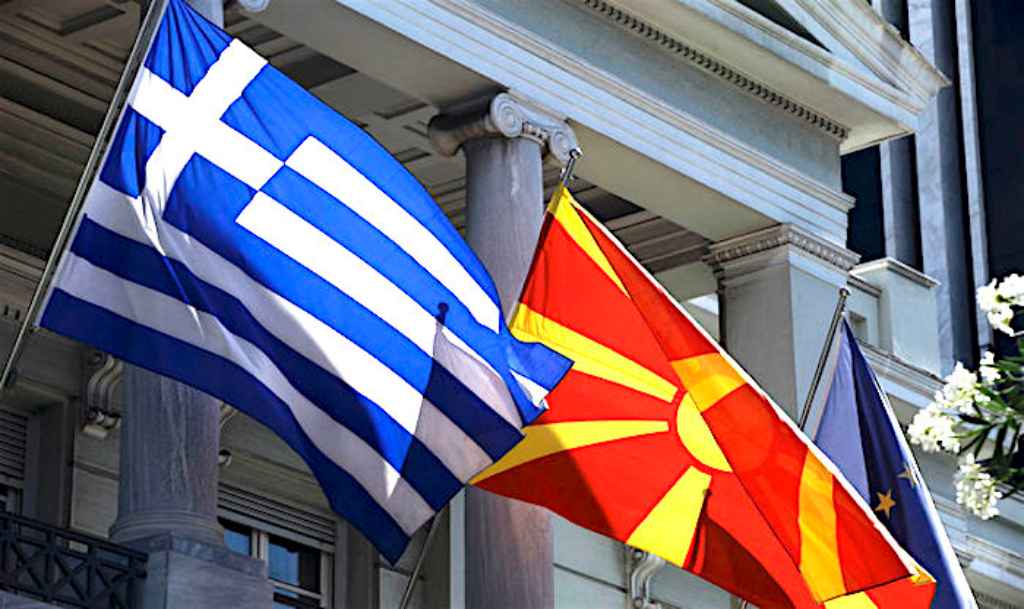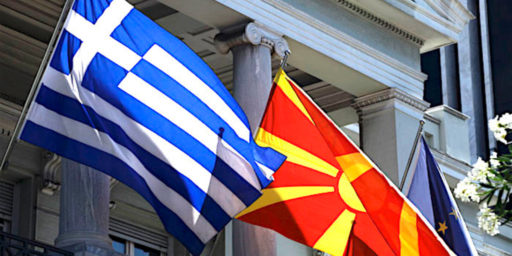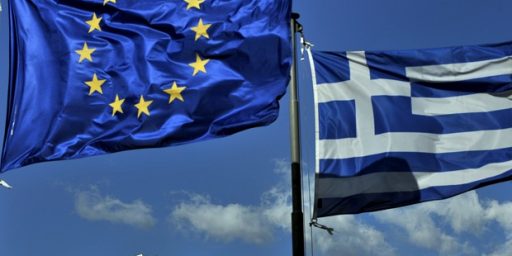Macedonia Name Dispute Still Unresolved After Referendum
The three-decade-old name dispute between Greece and the former Yugoslav state of Macedonia remains unresolved after Sunday's referendum.

Just over three months ago, Greece and the former Yugoslav region of Macedonia, which has been an independent nation since 1991, seemed to settle a three-decade-old name dispute. Under the agreement, the nation of Macedonia would change its name to the Republic of North Macedonia to appease the Greeks, who objected to the name of the country due to the implications it allegedly posed for the Greek region of Macedonia. On Sunday, the nation of Macedonia (not the Greek province, try to keep that straight) held a referendum to approve the deal that was expected to be easily approved. Instead, the outcome has just added to the confusion and threatens to put the hopes of Macedonia (the nation) to gain membership to the European Union and NATO:
The results of Macedonia’s referendum on Sunday about changing the country’s name were resoundingly inconclusive — leading both sides to claim victory.
The referendum posed the question of whether to rename the country to North Macedonia in an effort by the government to end a bitter, three-decade dispute with its neighbor Greece and to join NATO.
Greece strongly opposes the country using the name Macedonia because it argues that implies territorial aspirations against a northern Greek region with the same name.
Of those who voted, 91 percent favored the name change, the state elections commission reported, with 95 percent of votes counted.
But only 36.5 percent of eligible voters went to the polls. With that low a turnout, getting the required support from the Macedonian Parliament could be difficult.
Since so few people voted, the opposition claims the measure failed.
“Those who voted against and those who decided to boycott showed that the vast majority of the people are against this agreement, and they are the ones who sent the strongest message today,” said Hristijan Mickoski, the leader of the main conservative opposition party.
The opposition is against the name change as proposed because it argues it could have secured a better deal in negotiations with Greece.
The turnout figure was a setback for the government and for Western leaders who had pushed hard for a solid popular mandate, although the governing party is confident it can muster the parliamentary votes to approve the name change.
“The will of those who voted now must be turned into political action inside Parliament,” Prime Minister Zoran Zaev, who leads the governing Social Democrats, said on Sunday night.
To approve the name change, the Macedonian Parliament must vote on constitutional changes. Mr. Zaev said that if opposition parties did not support the constitutional changes, then he would resort to “another democratic tool” — a call for early elections as soon as November — to ensure that the changes would be made.
The deal also still requires the support of Greece’s Parliament, which must decide whether to remove its objection to its neighbor’s joining NATO.
The question of whether to change the country’s name has polarized Macedonia, and Western officials say that Russia, long opposed to NATO expansion, worked to exploit those divisions with disinformation campaigns that flooded the internet in the weeks before the vote.
In response, prominent Western figures, including the American secretary of defense, Jim Mattis, visited Macedonia to try to persuade voters to back the name change. The governing party staked all its political capital on solving the issue and joining NATO, and potentially the European Union down the line.
The European Union commissioner in charge of negotiations to expand the bloc, Johannes Hahn, wrote on Twitter that the result reflected “broad support” for both the name change and “the country’s #Euroatlantic path.”
Not surprisingly, the argument is steeped in history and no small degree of radical nationalism:
The debate over the country’s name, which has its roots in the fourth century B.C. during the time of Philip II and his son Alexander the Great, has taken on a symbolic meaning far greater than the name itself.
Alexander was from a Hellenistic culture, so Greeks argue that the Slavic-speaking Macedonians have no right to claim his heritage in addition to arguing that the name change would suggest territorial aspirations.
In February, as negotiations showed signs of progress, tens of thousands Greeks marched to the Parliament in Athens, waving flags and chanting, “Macedonia is Greece.” The name, the marchers proclaimed, “is in our soul.”
But the real energy behind the protests, which occasionally turned violent, were the conservative Greek Orthodox Church and ultranationalists including the neo-Nazi Golden Dawn party. Western officials have said they believe that Russia and Kremlin-connected oligarchs also played an important role in spurring the protests.
Protests in Macedonia have been smaller but no less vitriolic.
The fact that nationalism, and particularly a variation on the right-wing populist nationalism is finding its way into this debate is far from helpful, of course, but it is unclear what role this could play in the effort to get this agreement ratified by the Parliament of Macedonia (er, Northern Macedonia or whatever it’supposed to be called at this point.) Ethnically speaking, of course, the nation of Macedonia has a lot in common with the Greek region of Macedonia and with Greece as a whole. Given this, one would have thought that it would have been easy for the two countries to resolve their dispute, but it has been proven to just make things more difficult.
To listen to the Greeks, one would think that the independence of a nation that, justifiably, called itself “Macedonia” would result in the sending of troops across the border into Greece to recapture territory in the region of Macedonia. This remained the case even though Macedonia the nation has a very small military compared to Greece and that it has never expressed any territorial interest in the region in northern Greece that happens to share its name. As a result of this, Greece has long objected to the admission of the nation of Macedonia to either the European Union or NATO. The agreement reached earlier this year was supposed to have resolved that issue, but now we’ll have to wait and see how the Parliament in Skopje reacts to the results of the referendum.



The nuts from there are delicious!!!
Wouldn’t it be easier to kick Greece out of the EU and NATO? just the threat of it should make them calm down and be reasonable.
BTW, at the time of Alexander and Philip, Greece didn’t exist. There was a mess of city-states which formed ever-changing alliances and fought each other a lot. They banded together only to resist Persia. They failed to effectively resist Alexander when he came calling.
Prior to Alexander’s conquest, Macedonia was a backwater much of Greece looked down on. Macedonians were allowed to compete in the Olympic Games, sometimes, but were regarded as country bumpkins.
Sure, that was like over two thousand years ago. But Greece is bringing it up.
@Kathy: I think any punitive actions by the EU or NATO against Greece would set a bad precedent in regards to Turkey.
OT…
Yyyuuuuggee article in the NY Times chronicling how Dennison is not a self-made man, but got his money the old fashioned way…from his dear old dad…and is likely guilty of tax fraud.
Bungie will be crying tonight…destroyed by the realization that his man-crush is a complete fake…from his teeth to his tan to his hair to his bank account.
https://www.nytimes.com/interactive/2018/10/02/us/politics/donald-trump-tax-schemes-fred-trump.html?action=click&module=Top%20Stories&pgtype=Homepage
It is indeed possibly the stupidest, most utterly childish international dispute in the world at this time (although your orange cretin perhaps could generate something equally childish and pointless with Canada I suppose).
@Kathy: Well kicking the Greeks out of EU would be a step up, but sadly unlikely to happen.
If any country did not live up to its own past mythos, it’s Greece.
@Daryl and his brother Darryl:
Too early to tell.
Except, we know it won’t affect his base at all. Remember, “Taxation is THEFT!!1!!!” El Cheeto was merely protecting “his” money from the thieves in Washington.
It won’t affect his standing with the broader GOP, either, as they are also against paying any taxes.
The statute of limitations, if any, has probably passed, too.
But we’ll see what shakes lose.
@Daryl and his brother Darryl:
And of course we know that once he had pissed that away, he started laundering money for the Russians.
@Lounsbury:
Yes and no.
First Alexander blew them away, then the Romans ate Greece. But one can argue the Hellenistic (ie Greek) period in the Mediterranean, Middle East, North Africa and western Asia (as far as India), plus the ascendance of Greek rulers in the Eastern Roman Empire (ie Byzantine Empire), were the largest force that shaped the cultures of these areas, until the rise of Islam when Muslims took over culturally in some parts.
That said, today’s Greece bears no relation to Ancient Greece. But then, Turkey bears lite resemblance to either the Ottoman or Byzantine empires. Italy looks nothing at all like the Roman Empire. And looking at Egypt today, would you believe it was once the wealthiest region on Earth?
I’d say Ancient Greece is still culturally dominant. Modern Greece is not.
As a descendant of Slovenians, I hereby give the present day Macedonians permission to call themselves the Republic of South Serbia. There, problem solved.
@Daryl and his brother Darryl: Ah, good one. As as is the bar joke.
A missed opportunity for corporate sponsorship. Renaming for advertising revenue could have brought in a substantial investment.
Brawndo: it’s got what plants crave.
@Kathy: Eh what?
I said “If any country did not live up to its own past mythos, it’s Greece.” – Past mythos, it’s own myth of itself.
I don’t need comment-level summaries of history thanks, having a proper education, not some provincial navel gazing education.
@Lounsbury:
Kathy might not have gone to Eaton, but she’s pretty smart…for a colonial.
@Lounsbury:
How about prophecies implicit in mythology, and the Greeks’ own awareness of their own decline?